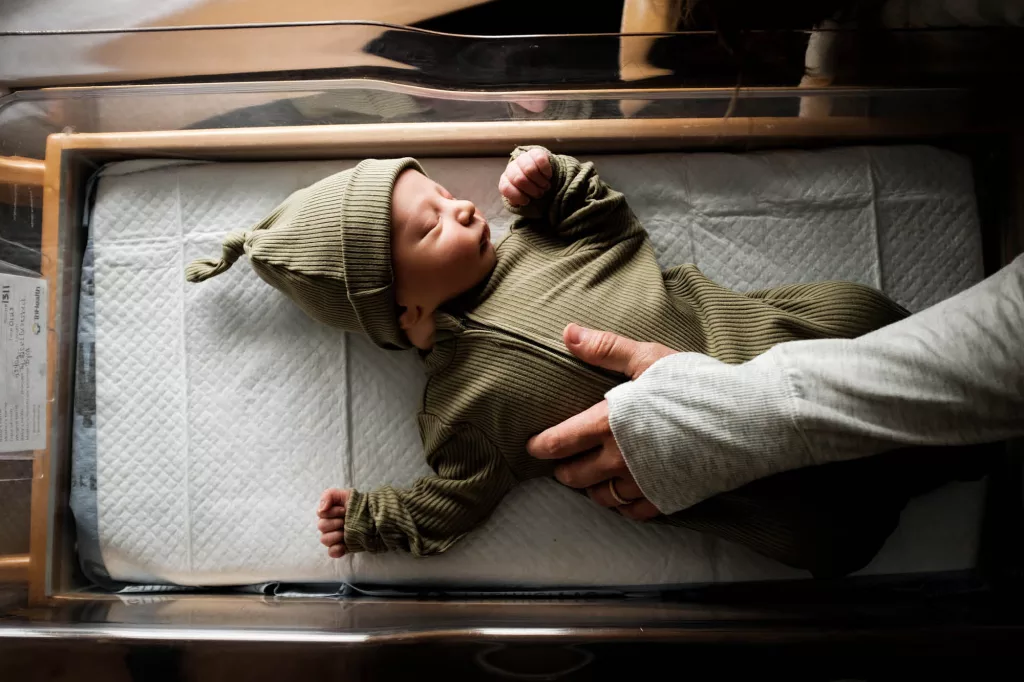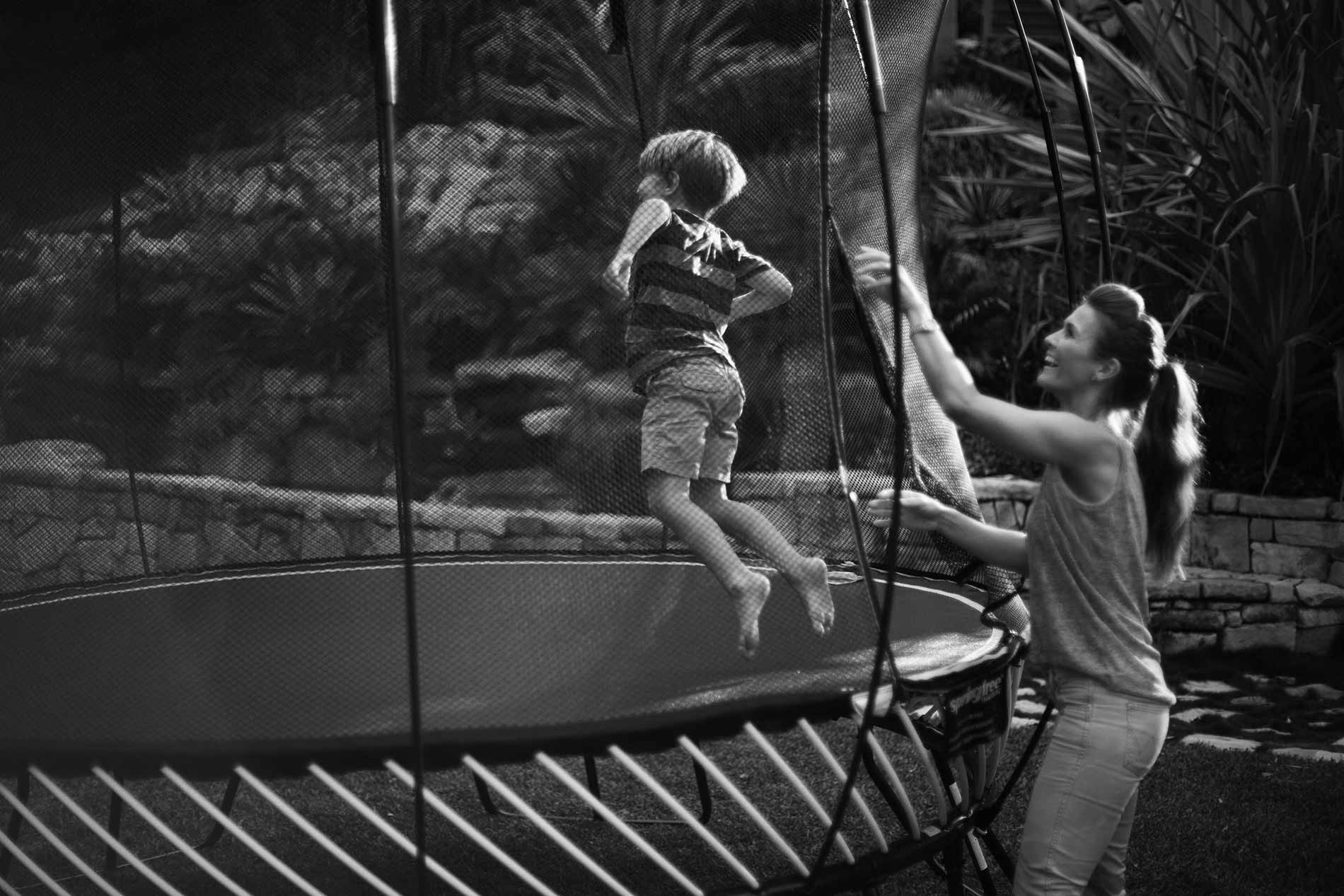POWERED BY NANIT
Want your baby to sleep through the night? Slip into the science of baby sleep so you can feel more inspired and less tired. Here’s what you need to know. #tiredasamother
This feature is Part 2 of our Wellness Series in partnership with Nanit, tackling some of the biggest challenges faced by mothers today. Read Part 1 here, Part 3 here, and sign up to our newsletter for more.
When you are in the throes of early motherhood, sleep is all consuming.
You are constantly wondering if your baby is sleeping enough, or sleeping too much. You fear that you are creating bad habits by feeding, rocking and shushing them to sleep [but you don’t know what else to do and you just really, really need your baby to sleep].
It is exhausting. You’re not imagining it.
“Lack of sleep has been shown to be incredibly detrimental to many aspects of health,” says Dr Natalie Barnett, who is a Paediatric Sleep Specialist and Vice President of Clinical Research at Nanit.
“It is associated with cardiovascular problems, obesity, endocrine issues among others, and significantly, lack of sleep really affects mood for both babies and parents. The whole family is happier when they are sleeping.
“IT’S EXHAUSTING. YOU ARE NOT IMAGINING IT. LACK OF SLEEP REALLY AFFECTS MOOD FOR BOTH BABIES AND PARENTS. THE WHOLE FAMILY IS HAPPIER WHEN THEY ARE SLEEPING.”
Understanding baby sleep
There is so much to know about baby sleep, and with a lot of conflicting information available, it’s often hard to know what to believe. Here are the most important key players behind baby sleep that can change everything.
The sleep cycle
Just like us, babies have sleep cycles. But here’s the kicker: their sleep cycles are much shorter, with frequent awakenings. So when your little one wakes up just 20-45 minutes into their nap, it’s not always because they are being divas, they are transitioning from one sleep cycle to another.
The sleep schedule
With newborns, we’re not talking 9pm to 7am type schedules [if only, right?!]. Newborns sleep A LOT. About 16-18 hours a day. But their sleep is sprinkled throughout the 24 hours. It’ll be a few months before they start to understand night from day. Until then, expect sleep to be a round-the-clock slumber party.
The sleep environment
Create a conducive environment for sleep. Make it cool and dark. A white noise machine can also work wonders. Swaddles also help newborns feel secure and keep those startle reflexes in check.
Safe sleep guidelines
This is the non-negotiable one. Always put your baby to sleep on their back in their own cot with a firm mattress. Remove all loose items like blankets and toys to minimise the risk of SIDS (Sudden Infant Death Syndrome). Remember, safety first, always.
Sleep training
If you are wanting to sleep train, it doesn’t typically doesn’t start until your little one is about four to six months old, and even then, it’s all about following your baby’s cues. You’re their mama, you know them best. “Once your baby is around four months old, they are capable of soothing themselves if given the chance,” says Dr Barnett. “I suggest gradually giving them the opportunity to fall asleep by themselves in the cot at the beginning of the night so they can hopefully naturally and gradually learn how to get themselves to sleep. Once they can do that, it’s very easy for them to fall back to sleep when they wake during the night if they are not waking for a feed.”
Sleep when the baby sleeps
It can be tough with a newborn, but try to squeeze in naps when your baby naps.
It’s not a competition
If your friend’s baby slept through the night at two months, good for them. But that doesn’t mean your baby will. Each little one is unique, so let’s drop the sleep comparisons.
The science of baby sleep
There is a science behind sleep, and understanding this can help in understanding why your baby might be waking at night. So why is sleep such an important factor for babies? Here’s the lowdown.
Brainy benefits
For your baby, sleep is not just about rest – it’s also about brain development. During sleep, the brain forms new connections, consolidates memory, and even does a little housekeeping by clearing out waste. It’s the prime time for your bub’s brain to grow and develop.
Growth and healing
While your babe is catching their zzz’s, their little bodies are also at work. Sleep promotes growth and healing. The body produces more protein molecules to mend any cells that have been damaged by stress or harmful exposure.
Immunity boost
Because sleep helps to strengthen the immune system, a good night’s sleep can ramp up their body’s ability to fight off infections.
Learning and development
For your little one, good sleep supports their cognitive development. It helps with learning, problem-solving skills, and attention. Those sweet dreams are literally paving the way for your bubba’s bright future.
How it affects you
When you are not managing to get enough sleep because your baby is waking through the night, this can have an impact on you in the following ways.
Mental health
Good sleep is your ticket to looking after your mental health. It reduces stress, anxiety, and the risk of postnatal depression. It allows you to recharge and reset, giving you the mental strength to face what motherhood throws at you. “I think it’s easy as mums to deprioritise our own sleep and I can’t stress enough how important it is for mums to get the sleep that they need,” says Dr Barnett. “It’s important for your own health that you prioritise your sleep, as well as your baby’s.”
Baby bonding
Good sleep can positively impact how you bond with your bub. That’s right. Well-rested parents are more responsive and sensitive to their baby’s cues, and that fosters secure attachment.
Happy hormones
Poor sleep can disrupt appetite hormones, so getting enough sleep is important to look after your postpartum body and mind.
Emotional wellbeing
Sleep deprivation can make us more emotionally reactive. Good sleep helps regulate emotions and contributes to emotional wellbeing for both mama and bub.
Myths vs reality
There are a lot of myths and lies around baby sleep, which can leave you feeling like you are either failing as a mother, or that your baby is difficult, when neither are true. Let’s take a look.
MYTH: Some babies are ‘bad’ sleepers
One of the biggest misconceptions is that some babies are ‘bad sleepers’. This is incorrect. “All babies can learn how to sleep,” says Dr Barnett. “Some babies learn how to sleep very naturally and easily without much help from their caregivers, and some babies just need dedicated time and effort to learn how to sleep.”
MYTH: Babies will sleep when they’re tired
Oh, if only it were that simple, right? Unfortunately, over-tired babies have a harder time falling asleep, and they wake more frequently. So, don’t wait for the signs of an exhausted baby, look out for those sleepy cues [like yawning, eye rubbing, and fussing] and whisk them off to slumberland.
MYTH: All babies should be sleeping through the night by six months
Don’t we wish? While some babies do sleep longer stretches at this age, many don’t. And that’s okay. Their little bodies and brains are growing so rapidly, they need to refuel often, and that can mean night-time wake-ups.
MYTH: Rice cereal before bedtime will help babies sleep longer
This old chestnut. Research actually shows that starting solids, including rice cereal, doesn’t have any consistent impact on sleep. Don’t rush into solids before your babe is ready, hoping for that elusive uninterrupted night of sleep.
MYTH: Sleep training means letting your baby ‘cry it out’
While there are some sleep training methods that involve crying, there are also more gentle approaches, too. And remember, what works for one family may not work for another. You know your baby, so trust your instincts.
MYTH: If your baby isn’t sleeping, you’re doing something wrong
This goes through the mind of every tired mum at some stage. But you are doing nothing wrong. Every baby is unique, just like every mother. Don’t let anyone tell you that you’re at fault if your little one isn’t logging eight uninterrupted hours of snoozing.
How to help you survive the baby sleep saga
Trust your instincts
There is a lot to be said for a mama’s instinct – sometimes she just knows that her baby wants nothing but to be held and close to her. “In those first few months do whatever you need to do in order to get your baby to sleep. You rock, you hold, you pat, you shush – you can’t make any ‘mistakes’. That said, you must always follow the safe sleep guidelines and have your baby sleeping in a safe space,” says Dr Barnett.
Tag team with your partner
Sleepless nights are tough [those deep, dark hours can feel long], so if you have a partner who is able to share the night duties, get them involved. This can also change any habits which may have been formed by your baby. “Mums whose partners help out at night are far more likely to get more sleep and less likely to suffer from postnatal depression,” confirms Dr Barnett. For breastfeeding mamas, try pumping so that your partner can give your baby a bottle now and then.
Track your baby’s sleep
Baby sleep tracking via a smart monitor is revolutionising motherhood, helping create some solid sleeping habits and taking the guesswork out of the equation. “Having a good understanding of your baby’s sleep can be incredibly powerful for parents,” says Dr Barnett.
Have a consistent routine
When it comes to bedtime, consistency is key. A soothing bath, a quiet book, a gentle lullaby – they all signal to baby that it’s time to sleep.
6 sleeping essentials to reduce waking
1. FIX THE TEMPERATURE
Make sure your baby and their environment are the correct temperature. A cold mattress will never be as appealing as a warm you. Temperature matters.
2. USE SWADDLES / SLEEP SACKS
Swaddling mimics the snugness of the womb, helping newborns feel secure. Once they start rolling, transition your baby into a sleep sack.
3. EMBRACE WHITE NOISE
The shushing sounds of white noise not only mimic the noises your baby heard in utero, but they also drown out household noises that might startle your sleeping beauty.
4. INVEST IN A SMART MONITOR THAT HAS SLEEP TRACKING
Being able to track your baby’s sleep is a total game changer. It gives you better control and understanding, helping you to help your baby sleep. We recommend the Nanit Pro.
5. MAKE IT DARK
Turn day into night with blackout blinds. This can be especially helpful during those long Summer days when you’re trying to convince your babe it’s bedtime.
6. GET A NIGHTLIGHT
A soft nightlight can help with those middle-of-the-night feedings or nappy changes. It’s all about keeping the environment calm and sleep-friendly.
Navigating baby sleep is hands down one of the hardest parts of motherhood. But as with all seasons, it doesn’t last forever. May your coffee be strong, lady.
This feature is Part 2 of our Wellness Series in partnership with Nanit, tackling some of the biggest challenges faced by mothers today. Read Part 1 here and sign up to our newsletter for more.
Disclaimer: No material on this site is intended to be a substitute for professional medical or health advice, diagnosis or treatment. Always seek the guidance of your doctor or other qualified health professional. Please refer to our Medical and Health Disclaimer for further information.










